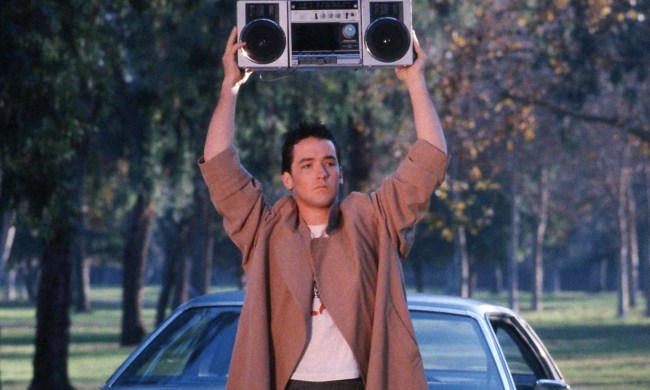Take a look at the top podcasts on iTunes and two things are evident: People love to laugh and they love to talk about murder. The comedy and true crime genres have come together again and again in the past few years to stunning success. Shows like Last Podcast on the Left and My Favorite Murder have garnered millions of listens and rabid fanbases.
The question, though, is how do comedy and murder go together? One makes us feel good while the other plumbs the depths of society. There have been many accounts of what comedy does for grief, but we decided to go straight to the source — we talked to two podcasters who have found a way to bring the highs and lows of humanity together in two delightful, weekly packages.
(Before we go any further, if you feel like you need something to drink, check out our true crime cocktails here. Or, just go on and sign up for the true crime wine club. You can also just pick up a bottle of 19 Crimes wine. The podcasts we’re talking about may have comedy and true crime covered, but we’ve got booze and true crime covered … just not in the “this will put me in jail/actual crime” kind of way.)
James Pietragallo (left) and Jimmie Whisman (right), known as the True Crime Comedy Team, are the hosts of not one, but two true crime comedy podcasts. Their first, Crime in Sports looks at exactly that: crimes committed by athletes. Their second, and one that is rapidly gaining in popularity, is Small Town Murder, which is also pretty self-explanatory.
It’s one thing to talk about murder and another to just tell jokes, but to host a podcast that blends both together? We sat down with Jimmie Whisman and got the scoop on how they do it.
It all started as a means of building audiences as comedians. With countless “cubicle warriors,” as Whisman calls them, eager for something to pass the time as they work in the office day in and day out, a podcast seemed like the perfect avenue. They went in the direction they did because they were both fascinated by true crime. Their first try at mixing the two was Crime in Sports.
“We chose crime because [Pietragallo] loves crime and I love crime, and we wanted to mix comedy because, at the time, there weren’t many of those,” Whisman says. “Then we chose sports because, well, we both love sports. Sports also helped to make the podcast entirely different [from other crime podcasts]. Once that one started to pop, we wanted to cover the most unknown that we could find. We wanted to do the [crimes] that were salacious in small towns and make that as unique as possible.”
The narrow genres helped them define who they were and also avoid the stories that the other podcasts were all already doing. “There are so many that are just centered around crime and the things that everyone knows. There’s only so many times you can hear the Jeffry Dahmer story,” Whisman elaborates.

From there, it was a matter of finding the facts (and the crimes) that no one knew. Those sorts of details are Pietragallo’s bread and butter, according to Whisman.
“[Pietragallo] is nothing less than amazing when it comes to research. He doesn’t quit until he knows everything, until [in the case of crimes that have been covered] we have a nugget that nobody else has found.”
Research, Whisman says, has leads them from standard archives to a wide variety of other sources, oftentimes taking hours upon hours to compile all the necessary information needed for each episode. In the case of Small Town Murder, this means going into the local records of towns that more often than not have populations of less than 500 (such as in Episode 46, which took place in Gatesville, North Carolina, which has a population of 305).
Not exactly bustling metropolises with extensive online archives, that’s for sure.
Once the research is done, it’s time to form it into a cohesive podcast that both informs and entertains. You might not think the retelling of a brutal crime can be entertaining, but Whisman says it’s not such a far leap. “I think people in general love hearing a terrible story because at the end — as long as there’s some sort of closure — people enjoy hearing that the person has been punished for a terrible deed or a needless act.”
Listening to such a podcast — especially one filled with jokes, Whisman suggests — also may contribute to a form of escapism. “I think it says that everybody wants to feel better, that their life isn’t awful. We can all have a really bad day and think that it’s the worst that can happen, but there’s always somebody that had a worse day.”
But, success or not (and they have had success, as they’ve been able to now book some live dates across the country), you would think that, week after week, all of these terrible things leave a lasting impact on the hosts. To an extent, they do. Certain crimes stick out more than others and retelling them isn’t easy.
When it comes to the athletes, Whisman says, the ones that are most impactful for him are the people he grew up watching, unaware of the poor choices they were making at or around the time they were popular — people like Vernon Maxwell and Chad Curtis.
“It’s really fascinating what power and money will do to your ego and make you believe you can get away with. We’re seeing it today with everybody, basically,” he says.
For the small towns, the ones that stand out (and are the hardest to get through) are, perhaps obviously, the most depraved. “We had to stop in the middle of the bone-breaking episode so I could go get sick. I’m blown away that somebody is capable of doing that to another human being and more so that I didn’t know about it.”

Oftentimes these crimes are under-reported — another reason Pietragallo and Whisman want to cover them.
“People’s attention spans are so short and that’s not helped by the fact that there’s always something else terrible happening,” Whisman says. “Why is it we’re running with the mother who drowned her daughter and not any of the other horrible events?”
Could these podcasts, then, also act in a way as a memorial for the victims? Whisman says they might.
“One of our episodes was about a woman in Marydel, Maryland. A listener pointed out that she died four days after the episode was released. I took an odd sense of pride in that because we got to tell her story before she died,” he says.
With so much depravity, is it possible that the true crime genre could lose the popularity it has gained? Whisman doesn’t think so.
“This isn’t a new thing. Dateline is still one of the most popular shows, as well as 48 Hours,” he says. “People are fascinated with what makes a criminal do the things they do, and they don’t really understand the desperation that it takes to do those things. I don’t think that’s ever going to stop.”
Need a new podcast, but murder isn’t your thing? Check out our favorite podcasts for road trips, our top overall picks for 2018, these productive podcasts to help get your life together, some spooky horror podcasts, the best fiction podcasts overall, or The Manual’s own podcast. Need more suggestions? Here are some of our faves for men’s fashion and craft beer.
If you’re new to the podcast, you’ll need one of the top apps for listening. If you’re more interested in the small screen, these are the best podcasts that have been adapted into TV shows.





